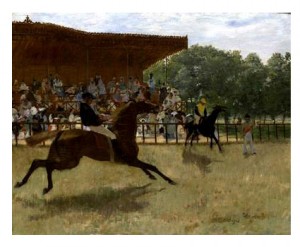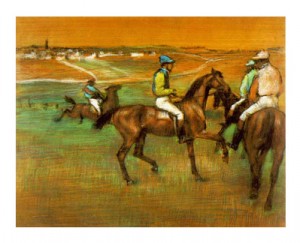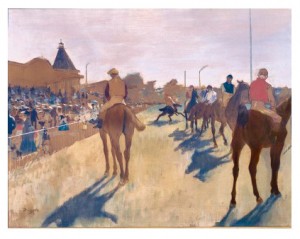For Thursday Art-Day: Degas and his horses.
We especially know Degas for his ethereal dancers but his love of movement is astounding in his horses.
Dancers
Art history today teaches us that Degas is considered a revolutionary force in the impressionist movement, even though the artist himself rejected the label. In fact he was known to ridicule the impressionist techniques of exaggerated colour and light. Instead Degas saw himself as a classic realist.
Degas was born in 1834 and during his 83 years he created some of the most revered artworks in history. From a young age he was serious about his talent. He was a painter and sculptor who worked with both prints and sketches. Apparently by the age of 18 he had converted his bedroom into a studio and had a real desire to be a historical painter. He was an academic who studied vigorously. This knowledge saw him fusing tradition with his own vibrant eye for the world around him.
Degas’ was devoted to past masters and his extensive education in literature and history shaped his style. The ethereal lethargy of his illustrations and striking female nudes still astound today with their comprehension of form.
Racehorses
Degas’ personal wealth gave him freedom to devote himself to art. He shunned formal training, preferring to study the Renaissance through frequent trips to Italy and – on his own doorstep – copying in the Louvre. There in 1862, he and Manet met in front of a Velazquez.
Horses before the Stands
Around 1861, Degas began to paint scenes at the racecourse. Degas’s ‘Horses Before the Stands’ (1866-68) would be considered an Impressionist painting full of life. Every aspect of horse racing was modern: a fashionable crowd, a leisure time activity, and the elements of motion and speed. In his daring approach to composition, inspired in part by Japanese prints and the new medium of photography, Degas boldly cut figures off at the border of his frame, giving the sense of spontaneous action.

False Start
His emotive portraits will always echo through history and are considered consummate triumphs.
Degas died on the 27 September, 1917 in Paris.



Leave a Reply